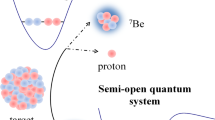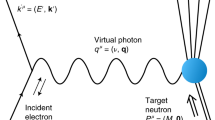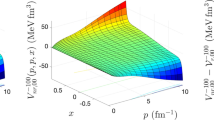Abstract
RECENT theoretical investigations1 of high-energy nucleon–nucleon scattering have involved the use of non-central forces in the description of the interactions between nucleons and consequently have predicted neutron and proton polarization. Experimental evidence for proton polarization was first obtained by Oxley et al. 2 at 240 MeV., and preliminary results from Harwell at 133 MeV., Chicago at 337 MeV. and Berkeley at 300 MeV. were reported at the Rochester nuclear physics conference3. Neutron polarization effects are much smaller than proton polarization effects under all the experimental conditions investigated to date3.
This is a preview of subscription content, access via your institution
Access options
Subscribe to this journal
Receive 51 print issues and online access
$199.00 per year
only $3.90 per issue
Buy this article
- Purchase on SpringerLink
- Instant access to full article PDF
Prices may be subject to local taxes which are calculated during checkout
Similar content being viewed by others
References
See, for example, Goldfarb, L. J. B., and Feldman, D., Phys. Rev. 88, 1099 (1952); and Swanson, D. R., Phys. Rev., 89, 749 (1953).
Oxley, C. L., Cartwright, W. F., and Rouvina, J., Phys. Rev., 93, 806 (1954).
Report of the Fourth Rochester Conference on High-Energy Nuclear, Physics, 1954.
Author information
Authors and Affiliations
Rights and permissions
About this article
Cite this article
DICKSON, J., SALTER, D. Proton Polarization at ∼ 130 MeV.. Nature 173, 946–948 (1954). https://doi.org/10.1038/173946a0
Issue date:
DOI: https://doi.org/10.1038/173946a0
This article is cited by
-
Polarization in proton-beryllium and proton-proton scattering at 1.7 GeV
Il Nuovo Cimento (1961)
-
Phase shift analysis of proton-proton scattering experiments
Il Nuovo Cimento (1957)
-
On the phase-shift analysis of high-energy p-p scattering
Il Nuovo Cimento (1957)
-
Une analyse en déphasages de la diffusion et de la polarisation dans les collisions proton-proton à grande énergie
Il Nuovo Cimento (1955)



